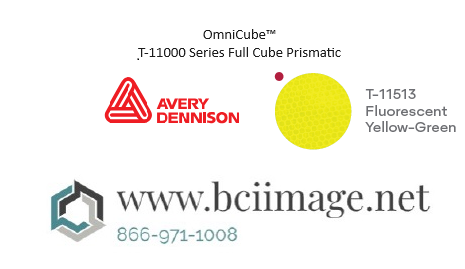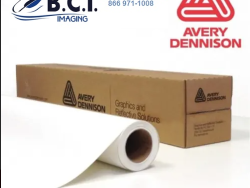Description
Avery Dennison® T-6000 & W-6000 HIP High Intensity Microprismatic Retroreflective Film yellow
Avery Dennison T-6000 & W-6000 Series
High Intensity Microprismatic (HIP)
Retroreflective Film for permanent and
temporary traffic signage, is a high-quality,
durable, microprismatic retroreflective
material with a pressure sensitive adhesive.
Its unique microprismatic construction
provides a high level of retroreflectivity for
demanding traffic control situations.
T-6000 & W-6000 Series sheeting is an
Omni-Directional microprismatic film that
incorporates tiles of microprisms arranged in
multiple orientations. This feature – “Smart
at Every Angle” benefits agencies by
providing confidence that all signs will
perform with uniform visual reflectivity at all
sign face orientations.
Features:
Omni-Directional
High Intensity Microprismatic Retroreflective Performance
Field proven long term durability on safety devices worldwide
Uniform daytime and nighttime visual appear
The American Association of State Highway Transportation
Officials (AASHTO) has recognized that some retroreflective
films are rotationally (orientation) sensitive. Because this impacts
sign luminance, AASHTO has defined a specification to measure
orientation performance. Figure C shows how the orientation
sensitivity is measured. In order for a film to be considered
rotationally insensitive, the average percent difference (shown in
Figure C) must be less than or equal to 20%
CONDITIONS
When measured for orientation sensitivity as described in
AASHTO M 268-10, all Avery Dennison sheeting, both beaded
and prismatic, pass the specification as rotationally insensitive.
Therefore, no special identification marks or other features (such
as a datum mark, or distinctive seal pattern) are required to
denote optimum orientation for sheeting. Because the user can
expect visual uniformity regardless of orientation, no costly and
cumbersome fabrication techniques are required to orient sheets,
cut sign legend or border tape during sign fabrication.
Specifying agencies and sign fabricators are cautioned that some
Retroreflective sheetings, even of the same ASTM “Type” may
not provide consistent luminance for desired night visibility if the
sheeting is not applied in the optimal, or in uniform orientation.
Agencies and fabricators should be aware of this concern and
discuss the potential effects of rotation on luminance of specific
sheetings with their material supplier before beginning installation
and/or fabrication
0650100A1
0650100A2
0650100A3
0650100A4
0650100A5
0650100A8



Reviews
There are no reviews yet.